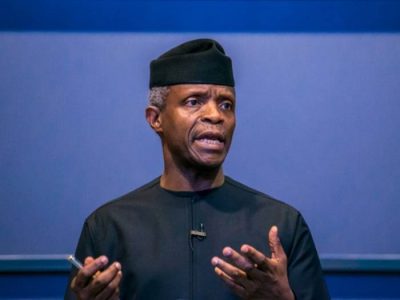FG recovers N7.8b, $378m through Whistle-blower’s policy
Vice President Yemi Osinbajo said yesterday that Nigeria recovered about N7.8 billion, $378 million and £27,800 through the Whistle-blower’s Policy launched by President Muhammadu Buhari in December 2016.
He also said the Federal Government met no savings in the accounts when the Buhari administration came on board.
Osinbajo spoke at the opening of the Open Government Partnership (OGP) Week holding at the Nigerian Air Force Headquarters, Abuja.
According to him, the Presidential Initiative on Continuous Audit (PICA), which oversees the Whistleblower’s Policy in the Ministry of Finance, has helped the government to save over N200 billion by eliminating ghost workers. PICA was established to clean up the payroll and pension system across all the ministries, departments and agencies.
Osinbajo said the government had included recovered assets in the country’s annual budget since 2017 and invested them in infrastructure as well as in the Social Investment Programme.
“All funds forfeited to the Federal Government are being included in our yearly budget proposals, for appropriation by the National Assembly,” he stated.
According to him, an executive bill has been sent to the National Assembly for the purpose of enacting a more comprehensive legislation on proceeds of crime.
Osinbajo said the Nigerian government was leveraging technology in a way that it had not been done before to underpin President Buhari’s commitment to transparent and accountable governance.
He said: “Nigeria’s experience has shown that technology and innovation tools as well as social media platforms are changing the ways in which citizens engage with government, and empowering citizens and non-state actors to take a more active role in holding government to account.”
Osinbajo also said that the measures taken by the government to fight corruption since the inception of the administration in May 2015 included the implementation of the Single Treasury Account (TSA) “that existed mainly as an idea, without the appetite for serious implementation” and the establishment of the Presidential Advisory Committee Against Corruption ( PACAC).
Other measures, according to him, were a National Open Contracting Platform (NOCOPO) developed by the Bureau for Public Enterprises; the Infrastructure Concession and Regulatory Commission (ICRC) launched its Public Private Partnerships (PPP) Contracts Disclosure Portal in September 2017 to ensure the timely disclosure of contract information from project initiation through to implementation; and the Citizens’ I-Monitor Portal developed by the Budget Office through the Open Budget Survey Index.
He said Nigeria was committed to joining the OGP, “an international multi-stakeholder initiative focused on improving transparency, accountability, citizen participation and responsiveness to citizens through technology and innovation” at the London Anti-Corruption Summit in May 2016 and became the 70th member of the organisation in July 2017.
Following this, the OGP Nigeria developed its first National Action Plan ( NAP) of 14 commitments with focus on four thematic areas of Fiscal Transparency, Anti-Corruption, Access to Information and Citizens’ Engagement.
“One of the remarkable things about the OGP is that it was designed to function as a partnership between governments and the private sector. Without this coalition-building, I doubt that much progress would be achievable. Regardless of whether the goal is improving infrastructure or fighting corruption, it is clear, and it has always been, that governments cannot do it alone,” the Vice President said.
Osinbajo recalled that on assumption of office, the rate of corruption was threatening the country’s existence, as the administration did not meet any savings.
“It was the reason why, in spite of record oil revenues between 2011 and 2013/14, we saw no savings, and very little investment in infrastructure and jobs, and, in spite of the billions of dollars reportedly invested in security, the Boko Haram insurgency did not abate.”
Speaking on the topic: ‘The impact of Open Government Partnership to Nigeria’s anti-corruption efforts’, Osinbajo said “for too long, the resources meant for the majority have been sadly cornered by a greedy minority”.
He went on: “Our government came into office on the back of a three-pronged agenda: ensuring security, rebuilding the economy, and vigorously prosecuting the fight against corruption.
“This last issue, corruption, has been an existential issue for Nigeria, threatening the very fundamentals of our existence.
“It has ensured that, for too long, the resources meant for the majority have been sadly cornered by a greedy minority.
“This issue of corruption underlines every aspect of our national life, from our security situation to the state of our economy.”
He said the President Muhammadu Buhari administration, on coming on board, adopted a two-step approach to dealing with the scourge of systemic corruption, first by stopping “grand corruption and the accompanying impunity”.
He said the second step “and the more enduring one” was “creating a self- sustaining system that assures transparency and accountability”.
Attorney General and Minister of Justice Abubakar Malami, who is the co-chair of OGP National Steering Committee, said five states had keyed into the OGP programme.
The states are: Kaduna, Kano, Anambra, Ebonyi and Niger.
The British High Commissioner to Nigeria, Mr. Paul Arkwright, announced that UK ministers had approved a new funding stream of 12 million pounds for priorities like Nigeria to deepen and implement open government reform committees. (The Nation)


